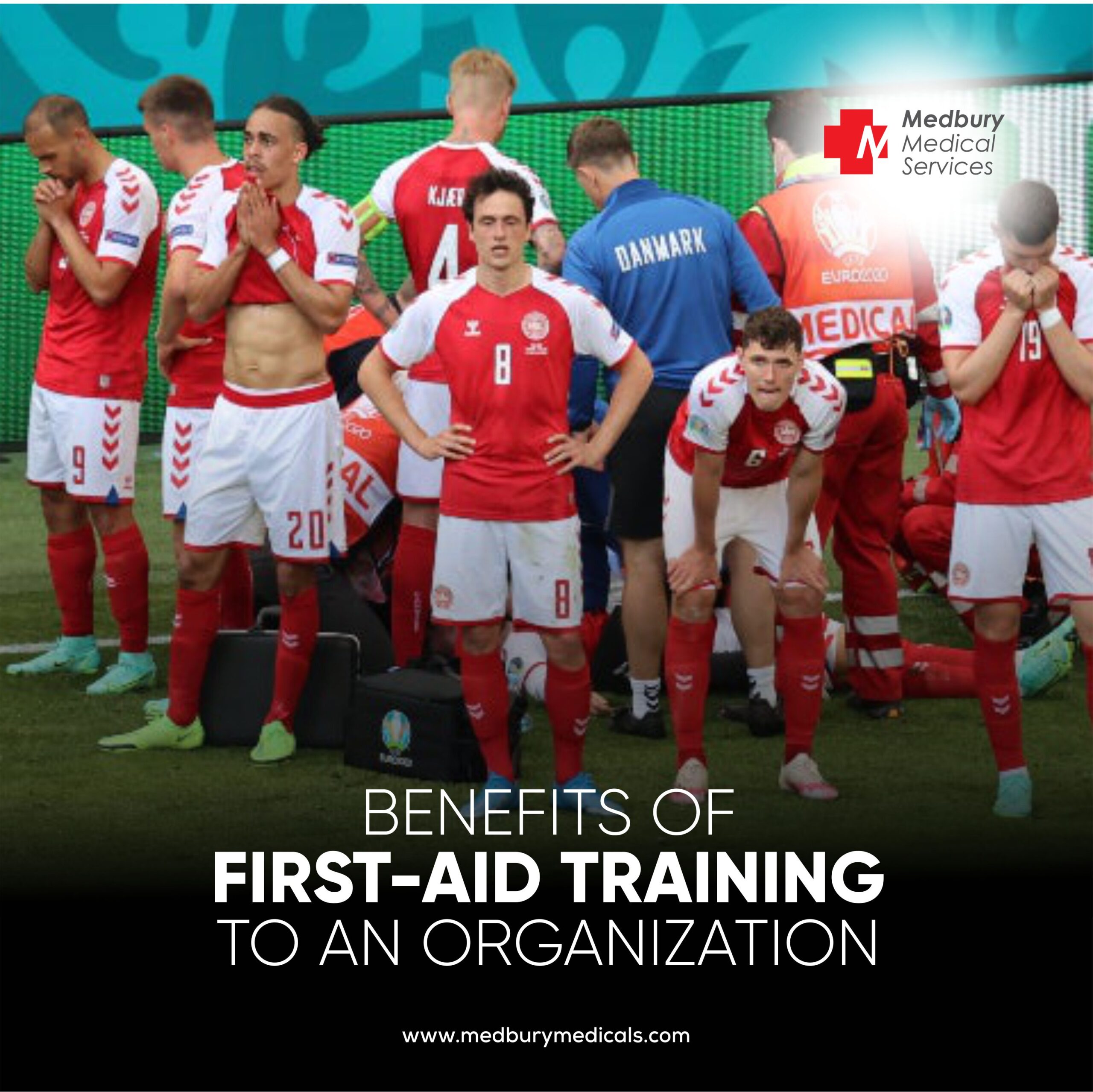INTRODUCTION

On the 12th of June 2021, Danish footballer Christian Eriksen shocked the world when he suffered a sudden cardiac arrest on live television. His heart suddenly stopped, thereby necessitating a 13-minute-long Cardiopulmonary resuscitation (CPR) that inadvertently saved his life.
Sudden cardiac arrest is a medical condition where an individual abruptly losses heart function, breathing and consciousness.
Every individual is susceptible to sudden cardiac arrest, injuries, illnesses and trauma; even if your workplace and home doesn’t seem like a dangerous place, accidents can happen at any time. We never know when an injury may happen to us, a colleague or someone we love. Therefore, it is always good to have someone with basic first aid knowledge to take care of critical situations and keep it from going from bad to worse or till the medical help arrives, especially in the work environment.
In today’s world, having a well-trained team that can administer first aid to victims in the event of accidents, mishaps and occurrences at the workplace is no longer an add-on but a necessity.
Researches have shown that the more First Aid certified people there are in an organization, the safer that organization becomes.
Therefore, it is crucial for as many people to have at least a basic knowledge of First Aid within any organization, irrespective of the industry.
The Health and Safety (First Aid) Regulation 1981 states that all workplaces must have:
- A stocked first aid kit
- An appointed first aider/s with adequate first aid training
- Information and resources for employees are highlighting first-aid arrangements.

WHAT IS FIRST AID?
First aid is the initial assistance given to a victim of injury or illness in its most basic form. Basic First Aid knowledge comprises relatively simple techniques and procedures that can be performed with limited equipment and is typically carried out until professional medical assistance arrives.
8 BENEFITS OF FIRST AID TRAINING
Having employees trained provides benefits that aren’t always obvious. In this article, we’ll look at some ways that first aid training can benefit you as an organization.
It’s more cost-effective
Many organizations consider enrolling employees in first aid training classes as expensive; they try to cut costs by training only a few work crew members.
However, the amount saved in this way is nothing compared to the costs if an accident happens and an employee ends up hurt.
The National safety council estimated that $161.5 billion was lost to work injuries in the year 2017. This figure includes wage and productivity loss of $50.7 billion, medical expenses of $34.3 billion and administrative expenses of $52.0 billion. Although, in this study, companies with well-trained First aiders within their workforce were noticed to have contributed very little to the above figure, not having a person who is trained to help those in danger can be very expensive if something happens.
The Nigerian Factory act of 1987 (ILO) makes adequate provisions regarding the safety of workers and employees. The Act applies and imposes penalties for any breach of any part of this act. The act has 11 parts, with part 5 primarily focusing on health, safety and welfare.
First aid saves lives

As evident by the Christian Erikson scenario, basic first aid can mean the difference between life and death at the workplace. A Red Cross survey showed a staggering 59% of deaths from injuries would have been preventable had first aid been given before the emergency services arrived.
According to the American Heart Association, an effective hands-only CPR provided immediately minimizes the risk of death by 4-5 times. However, unfortunately, only 46 per cent of cardiac arrest victims get CPR first aid by an onlooker, and this figure seems even lower in workplace settings.
The failure to act in case of cardiac arrest emergency leads to the death of someone’s loved one, which could have been avoided if people have realized the significance of CPR first aid training.
Employees are happier and more confident
The attitude of employees determines the success of the business. If the employees can perform their duties with high proficiency, the business will grow
Every employee that receives standard first aid education will be happy to gain new knowledge. They will also appreciate the efforts of the employers to protect them from dangers while they work.
After going through the first aid training, employees will be more confident to react quickly and efficiently if an accident occurs. That makes all the difference, as every second count.
Can build team relationships
Train your team all at once, and it can help build stronger relationships between your employees. It’s an excellent way for your employees to get to know each other and work with people they may not have worked with before. A team that is made of stronger relationships and can work effectively together will have overall higher productivity levels.
Improve company reputation
A company with very few accidents and a strong first aid procedure in place will be trusted more by potential employees and customers. A severe lack of health and safety can make it to the news and subsequently destroy a company’s good reputation. A safe, positive reputation will allow you the opportunity to hire the best of the trade, as employees would instead work for a company that cares about their health and wellbeing whilst at work.
First aid prevents medical situations from deteriorating
Knowing the basics of first aid can prevent a bad situation from getting worse. For example, consider a patient who is bleeding from a deep cut. Without intervention, the patient could suffer severe blood loss. By applying pressure using simple first aid techniques, you can prevent a medical emergency from rapidly deteriorating and stabilize the patient until further medical help arrives.
.
First aid increases awareness and reduces your susceptibility to accidents
Learning First Aid and becoming alert to potential hazards and medical issues increases our health awareness and allow us to take better care of ourselves, our friends and our families. It creates resilient communities and relieves pressure on the NHS.
Benefit First Aid Makes you prepared for anything
None of us knows what the future has in store for our loved ones or us. Sudden illnesses such as heart attack, stroke, severe bleeding and breathing difficulties require immediate attention, which after a course, you will be well equipped to provide. First aid also prepares you to deal with bleeding, burns, breathlessness, bites, shocks, stings, splints and fainting, so whatever medical situation life throws at you, you can respond effectively.
CONCLUSION

Accidents will always happen despite any measure of preventative procedure and care. Because of this, individuals who are properly trained and with the correct equipment are a huge help in ensuring better safety for everyone. Without proper First Aid, a simple injury could become severe, and, in some cases, fatalities can occur due to a lack of immediate medical treatment. First aid does not just promote faster recovery. It helps save lives.
Accidents can happen suddenly without any prior anticipation. However, at Medbury medical services, we believe that the first reaction when an accident occurs will determine how the accident will affect the victims. Therefore, Medbury offers first aid training courses that can be carefully tailored to fit your company’s size, industry, and culture.
Call us today on +234 912 286 9502 or 07013368570 and let us help you build a team that can save lives!







No Comments